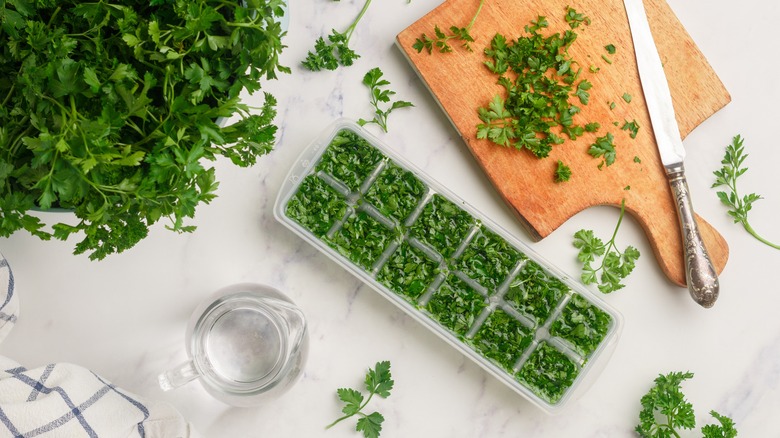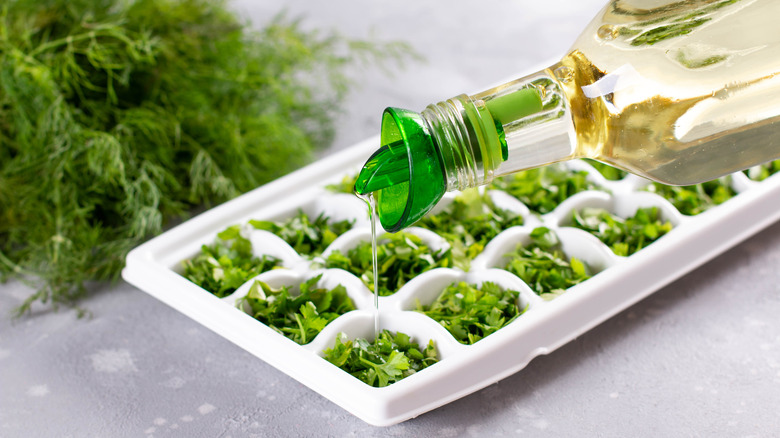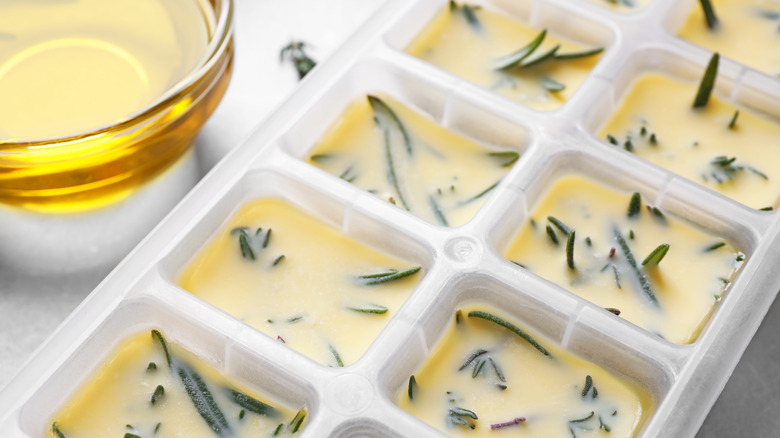Freeze Your Fresh Herbs In An Ice Cube Tray For Ultimate Freshness
We may receive a commission on purchases made from links.
Fresh herbs are ideal for infusing flavor into everything from winter stews to summer cocktails. Cilantro brings tacos to life, and basil is essential for Italian and Mediterranean dishes. Rosemary adds an earthy essence to your cooking, and you can use thyme for everything from roasted meats to cocktails. But most herbs aren't hardy plants, and even the more robust ones don't stay fresh forever. That's why you have to find a way to preserve an overabundance of herbs if you plan to use them past the growing season.
And there are many ways to do that. But one of the easiest ways is to store them in the freezer for year-round use in soups, stews, and sauces. Freeze your fresh herbs in ice cube trays to create flavor-packed measured servings of ready-to-use herb cubes. Freezing them in oil reduces some of the browning you get from other methods. But freezing them in water is also straightforward and makes them more versatile for both cooking and using as ice cubes for beverages, such as a sweet old fashioned cocktail.
How to make frozen herb cubes
Ice cube trays provide the perfect molds for making herb cubes you can use throughout the year. And there's no end to the kinds of trays to choose from. Silicone-bottomed ice cube trays make it easy to remove a single cube at a time and oversize ice cube trays provide larger servings. You can also find trays that provide smaller servings, such as heart-shaped ice cube trays and honeycomb ice cube trays, which can also add a whimsical element.
The most straightforward way to freeze herb ice cubes is using water. This method works best for herbs with a lighter structure, like basil and cilantro. Fill each space in your tray about halfway with chopped herbs. Drizzle in just enough water to submerge the herbs as much as possible and freeze overnight. The next day, you can cover the cubes with another layer of water if necessary and freeze again. Store the cubes in an airtight container. You can cook with water cubes, but they're also fun for garnishing drinks.
Another way to preserve fresh herbs is to freeze them in oil, making convenient aromatic cubes for soups and sauces. Woody herbs with strong structure and smell, like rosemary and oregano freeze very well in oil, infusing the cube with flavor. Freezing herbs in oil is very similar to freezing in water; pack your chopped herbs into an ice cube tray, filling each section about halfway. Cover the herbs with flavorless oil, like light olive oil or canola oil — your herbal oil cube serves as a base for cooking, so choose an oil you typically use for that.
Why freezing herbs in ice cubes works
Fresh produce goes bad because of chemical changes that take place as it ages. Enzymes are the main compounds responsible for rotting, and they go to work as soon as you sever the herb from the plant. Their main job is to break proteins down to their amino acid forms, and the result is an observable change in smell and color as well as a loss of nutrients. From every type of oregano on the planet to the wide selection of basil and thyme varieties, freezing herbs is one of the best way to stop this process.
That's because enzymes slow down as they cool, thus halting decomposition. Unfortunately, you can't beautifully preserve the look of the plant in the freezer. Many herbs will lose structure and appear scrunched after freezing, even if you freeze them at peak freshness, and they'll continue to wilt as they thaw. Though you can preserve herbs in other ways, freezing is the best way to preserve the essential oils that contribute to their flavor. So while frozen herbs don't offer the visual appeal of fresh herbs, they deliver an intensity that very nearly matches it.


